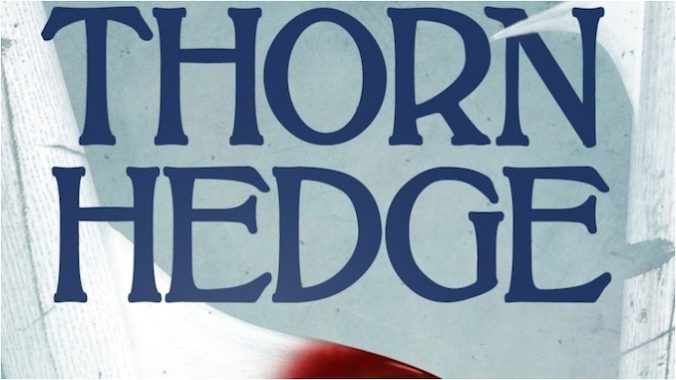Thornhedge Reminds Us That All the Best Fairytales Have Teeth

Popular culture tends to see fairytales in a very particular light: Colorful, romantic stories of princesses in magical castles, dashing princes, and first kisses, where good always triumphs and evil is always ugly. We like to forget that the original tales—whether passed down through folklore or penned by the Brothers Grimm themselves, are sharp, dark things, often uncomfortable, always complicated, and as likely to steal the breath from your throat as inspire dreams of happily ever after.
That is the kind of fairytale at the center of T. Kingfisher’s latest novella, Thornhedge, a delicate, sharp-edged story of a princess in a tower that’s actually a meditation on duty, loss, and grief. A bittersweet exploration of the power of language, the way stories shift and change over time, and the weight of the promises we make to others, it’s bleak and challenging and beautiful in all the best possible ways. If only because, at its heart, this is a story that reminds us, as Peter Beagle once said, there are no happy endings, not really—because nothing ever truly ends.
In the strictest sense, Thornheadge is a retelling of the fairytale of Sleeping Beauty, in that most of the elements of that familiar story are present: There’s a princess asleep in a high tower, guarded by an impossible wall of brambles and deadly thorns. A meddlesome fairy who either curses and/or saves the girl. Knights on the hunt for glory. A legend that refuses to die. Attempted rescue. Uncomfortable consequences. And an ending where all is put right again. Sort of. But, as you’ve probably already guessed, this isn’t that story. Not really.
While Thornhedge clocks in at less than 150 pages, it packs the emotional wallop of a book three times this size, helpfully reminding us that no one is doing more with less in the fantasy space than Kingfisher. Not a single word is wasted—even the punctuation feels insanely purposeful—and its delicate descriptors, mournful tone, and carefully crafted dialogue all feel deliberately arranged for maximum emotional and narrative impact.
-

-

-

-

-

-

-

-

-

-

-

-

-

-

-

-

-

-

-

-

-

-

-

-

-

-

-

-

-

-

-

-

-

-

-

-

-

-

-

-








































